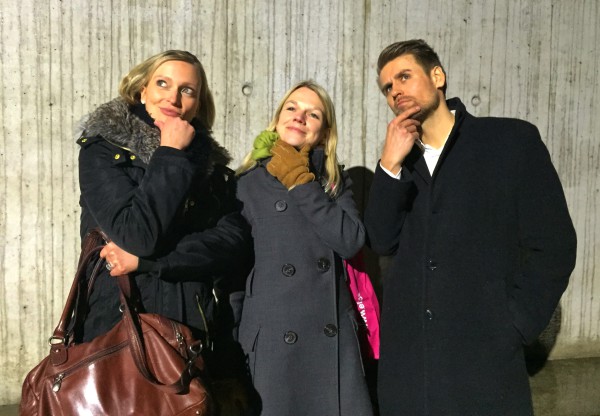Against the backdrop of budget cutbacks, Destination Management Organizations feel the need to increase efficiency for all their web and social media activities. The measurement of results, however, depends strongly on the relevance of the key performance indicators (KPI) chosen. These may vary strongly – from measuring the success of an online campaign to setting up benchmarks for various players within an organization.
KPIs in Tourism were a big talking point, too, at this year’s ENTER conference which took place in Lugano/Switzerland from February 4th to 6th. Which are the most suitable methods and appropriate tools to measure the success of web and social media campaigns? On behalf of Tourismuszukunft, I had the privilege to moderate the workshop „Digital KPIs in Tourism“ dealing with this question.

„Digital KPIs in Tourism“ – our session at ENTER 2015
I am extremely happy that a panel of distinctive speakers with a lot of experience in this field joined me at the KPI Workshop. In their presentations, they shared some practical insights into their methods and solutions on how to measure the results of web and social media campaigns:
- Catharina Fischer/German National Tourist Board: „What is a successful campaign? Useful KPIs for Social Media and Blogger campaigns“
- Wolfgang Töchterle/Südtirol Marketing: „How to measure the success of a large scale, storytelling-based communication concept – illustrated by the example of wasunsbewegt.com (storiedavivere.it)”
- Anne Köchling/Fachhochschule Westküste: „KPI benchmarking – insights from comparison. The example of an online-based business intelligence solution“
This Tourismusblog article – in English language, just for once! – is not only a review of their presentations: It will also provide some answers to questions I prepared for the session.
Catharina Fischer: „What is a successful campaign?“
Catharina Fischer has more than 8 years of experience in marketing and sales. She studied Tourism Management at the University of Applied Sciences Munich and at Edinburgh Napier University. She started her career in tourism with an apprenticeship in a private school in Berlin and worked over 2 years as a freelance project manager for an event consulting agency. Since 2011 she has been responsible for all social media activities and online public relations of the German National Tourist Board and has realized several international campaigns, especially blogger campaigns.
Last year at #ENTER2014 in Dublin, Catharina presented GNTB’s project #youthhotspotsgermany with insights on how to cooperate with travel bloggers. At #ENTER2015, she gave answers on the question: „What is a successful campaign?“
„A broad overview on what works best“
An interview with Catharina Fischer (German National Tourist Board)
Tourismuszukunft: I love the GNTB campaign because it provides KPIs on a large scale. There is a lot to take away from it.
Catharina Fischer: Yes, there is indeed. We not only watched our main targets like the traffic on our website and the app downloads. We also got deeper in each KPI of the different marketing activities worldwide and got a broad overview on what works best and when.
Numbers may be useful – but especially in terms of blogger and video content a lot depends on quality. How do you rate Quality vs. Quantity?
One of the best indicators is the shareability of such content. Great content gets lots of attention not only through views but also through shares.
Markets are different, online behaviour is different. How do you evaluate KPIs for different markets?
I agree but that does not mean that we have different KPIs for different markets. Because overall we are looking for the same output. So what we have are different targets for each market. The blogger landscape in the US for example is much more sophisticated and larger than in Poland or Switzerland. Therefore we know that we cannot expect the same results when it comes to engagement or content generation.
Let’s come back to scaling: Would the GNTB approach also work in a smaller scale, for a local DMO?
Of course. It does not matter how big your campaign is or how many countries are involved. What matters is that you define what you like to reach and therefore have certain targets. With that knowledge you can shape your approach online and especially in social media.
Wolfgang Töchterle: „How to measure the success of a large scale, storytelling-based communication concept “
Wolfgang Töchterle, Head of Digital of the South Tyrol Marketing, studied Business Administration at Leopold Franzens University of Austria, specializing in Tourism and Service Management – and for me, he is the one who has KPIs encrypted in his DNA. He was already dealing with them in his diploma thesis “Key Success Factors for Events” which was nominated for the Austrian Tourism Research Award. Performance is a key biographic indicator in his career: As a Consultant, he built up the hotel group Selected Hotels and provided external input for Karstadt Warenhaus. For the Coca Cola Company he was organizing promotion events. He knows the hotel business very well as former Director of Vitalpina® Hotels and Bikehotels South Tyrol. Since 2012, he is working on the improvement of the digital customer journey at South Tyrol Marketing.
In his presentation, Wolfgang Töchterle gave insights into one of his projects with South Tyrol Marketing: „How to measure the success of a large scale, storytelling-based communication concept – illustrated by the example of wasunsbewegt.com (storiedavivere.it)”
„The real challenge is to reach the right audience“
An interview with Wolfgang Töchterle (South Tyrol Marketing)
Tourismuszukunft: There is often one big mistake made in terms of KPIs – focussing on numbers only. So I like one of your KPIs best: the GCR (Goal Completion Rate). It’s not only about quantity – it’s about quality.
Wolfgang Töchterle: First: I think it’s not about the numbers itself. It’s about the changes in the numbers over time. It’s about development. About growth. About getting more effective. Second: In times of performance marketing and Facebook it’s easy to bring your message to a wide audience. Or to bring the audience to your landing page. The real challenge is to reach the right audience! People who have a real interest in what you have to say. And in this perspective you’re right: in the end of the day it’s about quality.
Your presentation shows that KPIs are work in process. You always can do better. Do you think that etourism still has a long way to go in redefining its KPIs?
The world is changing constantly. So are you. So are your clients. So is communication … and so are your KPIs. But at heart it’s pretty easy: Our job in the long term is to bring enough of the right people to our destination to enjoy it in real life … and to hopefully become fans. As long as we derive our KPIs from that, we’ll be fine. Just don’t lose track of your final objective.
Another aspect: It’s not the tools that define success – you must constantly redefine success in order to choose the right tools. Do you agree?
Yes and no: We just defined success: bring enough of the right people to your destination to enjoy it in real life. This won’t change. The problem we face in the tourism industry is that the customer journey can be extremely long. Sometimes there are years between the first contact and the booking. In this perspective I can only hope the tools will get better soon so that we can better measure success.
„We need to integrate syndication-success in our KPIs“: How would you define performance in terms of syndication?
It’s about measuring the buzz on external sites: comments, likes, tweets, retweets, shares, pluses … so about measuring all the things we currently aren’t able to see in Google Analytics, Facebook Insights or in other statistic tools that are related to our own accounts. The more buzz we can create, the better we’ve done.
You said, your target was to finally get ALL the fish in our the pond. Did you get all the fish with wasunsbewegt.com?
Unfortunately, I can’t answer this question. Not yet. The funny thing is: theoretically we almost have all the data to measure it. Almost everyone has a smartphone. From a data point of view that’s like having a chip implanted that’s collecting data about our target all the time. We just don’t have access to that data. Atlas by Facebook might be one step towards really identifying people cross device and over long periods of time. So, ask me that question again in two years 🙂
Anne Köchling: „KPI benchmarking – insights from comparison“
Anne Köchling studied International Business Studies at the University of Paderborn (Germany) and the University of Santiago de Compostela and complemented a Master of Tourism Management at the Freie Universität in Berlin. She started her professional career in destination management at the German National Tourist Board. For the tourism organization of Schleswig-Holstein she implemented new marketing strategies. Since 2010 she has been working at the «Institut für Management und Tourismus» (IMT) of the West Coast University of Applied Sciences / Fachhochschule Westküste in Heide. Currently, she is in charge of several market research and consulting projects related to the field of destination management.
The third approach to our topic is – at the same time – academic and hands on. Anne Köchling from the West Coast University of Applied Sciences travelled from the North Sea to Lugano to share her knowledge about KPI Benchmarking with the ENTER participants. The title of her presentation: „KPI benchmarking – insights from comparison. The example of an online-based business intelligence solution“
„Benchmarking helps to set realistic goals“
An interview with Anne Köchling (West Coast University of Applied Sciences)
Tourismuszukunft: There is one big takeaway for me from your presentation: Compare your KPIs! Is Benchmarking a completely new idea for DMOs? How good do they know the numbers of others?
Anne Köchling: Basically the idea of benchmarking is not new to DMOs – with view to metrics describing the development of the destination as a whole, e.g. growth in overnight stays or brand awareness, it is quite common in Germany already. But concerning KPIs for measuring the success of marketing activities we still see a need for action. The challenges mostly start even before thinking about benchmarking: For many DMOs it is difficult to define which KPIs are relevant to measure their marketing performance. In order to close this lack of knowledge, a KPI benchmark is very helpful because the DMOs can learn from each other.
What’s the effect of Benchmarking? Do DMOs often change their way of defining success?
By comparing their metrics the DMOs get a sensation if marketing activities were successful, just average or even a flop. Of course that helps them to set realistic goals for their future activities.
Another finding: Do not judge success from isolated KPIs – but: Try to integrate them in the big picture – marketing AND social media.
I think this is very important. Therefore in T-Fis the DMOs can control all their marketing activities in only one system and compare them with each other. Apart from bundling the information, the interpretation and discussion of the results is crucial.
You mentioned the costs of benchmarking. Can you scale benchmarking from big organizations down to smaller organizations or single companies? Does it still pay off? Does it still make sense?
Benchmarking makes sense for every company or destination – independent of the size! Every organization can only get better by evaluating their own performance. There are many KPIs that are not expensive or complicated to measure. But it is important to take into account with whom you compare your results. So in order to get a realistic picture, each organization should choose competitors on a level playing field. And of course some KPIs are more suitable for a benchmark than others – this should be considered as well.





